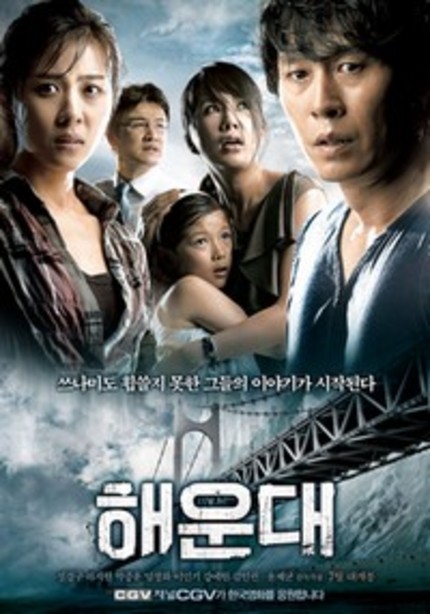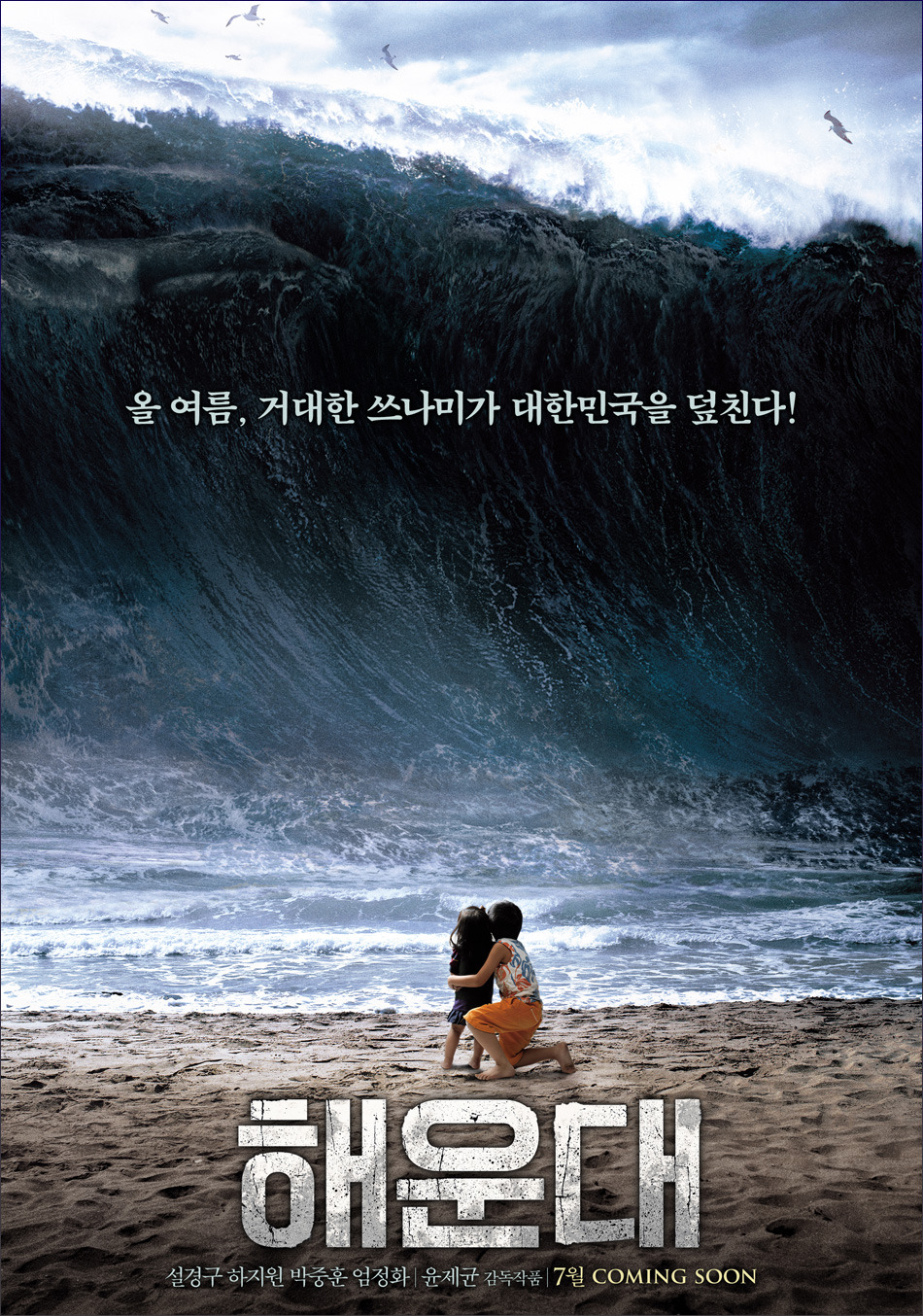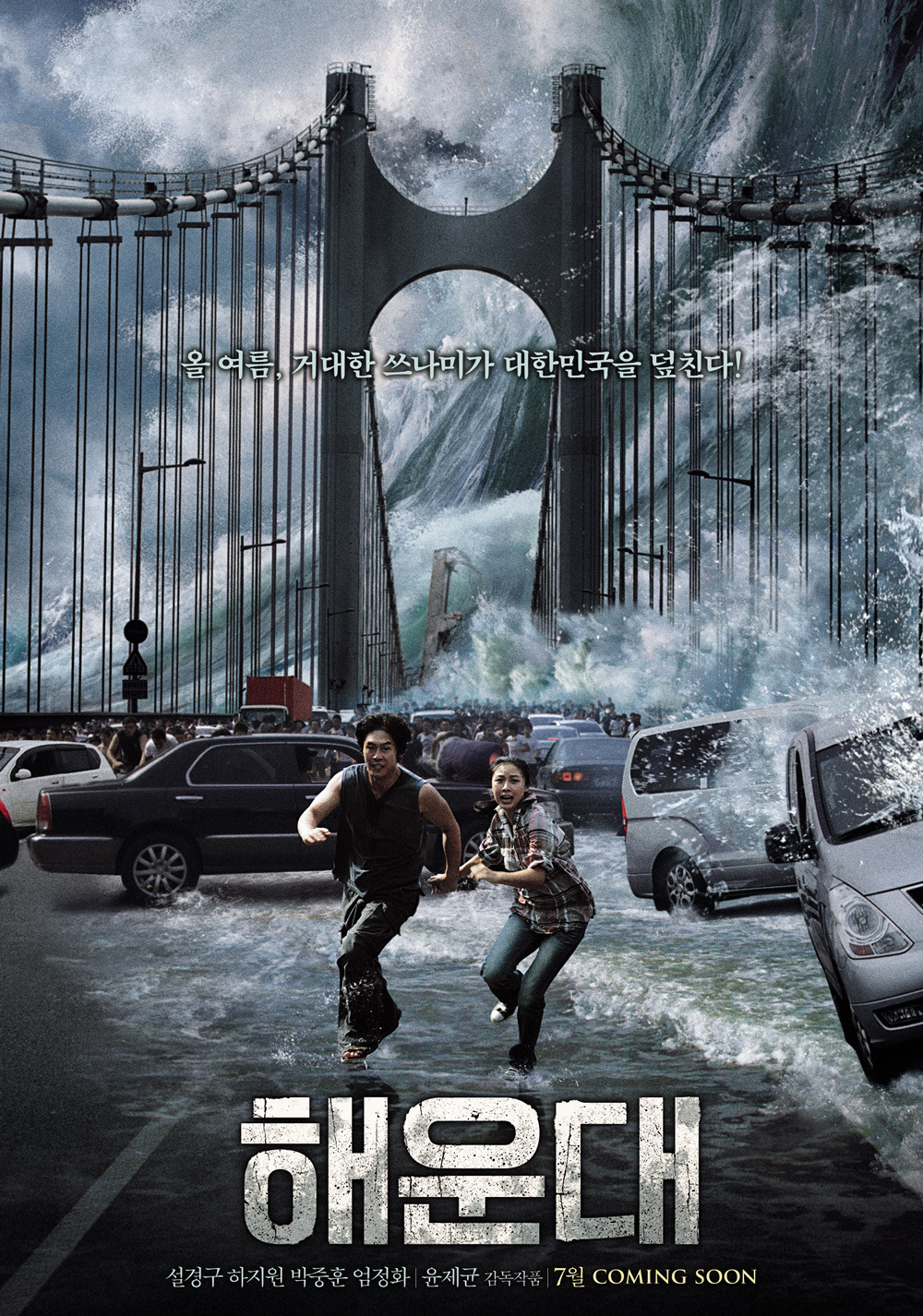Sitges 09: HAEUNDAE Review

I don't know whether, as William Penn suggested, popularity is truly plagued by many snares and offers no real benefit, but it surely can be an interesting beast. Particularly so when applied to Korean cinema.
You look at the numbers and, technically, you'll find out that five films over the last five years have managed to lure at least one fifth of the entire population to watch a single movie - I know, 태극기 휘날리며 (Taegukgi) is from 2003, but it did a good chunk of business in 2004, and you should never allow facts to get in the way of a good punchline. Impressive indeed, but much more so considering that it's not a single prolific machine that is producing such exploits, like Studio Ghibli's nearly uncontested domination over the Japanese box office, nor is it limited to that all encompassing umbrella of the CG spectacle, like in Hollywood. The current kingpin, Bong Joon-Ho's 괴물 (The Host), really is a two hour Kim Woon-Kyung family drama gone monster flick on us, its social and not-so-thinly veiled political dynamics always relegating the grumpy overgrown squid to a very expensive, and effective, supporting role. Also, Lee Joon-Ik's 왕의 남자 (The King & The Clown), one of the greatest underdog stories in Korean cinema history, is a lot more about Shakespearean Oedipus complexes than the usual glitzy and superficial squalor inhabiting most made-for-Korean-Wave sageuk. But then you face a case like 해운대 (Haeundae), and you're suddenly assaulted by a tsunami of rather puzzling vapors.
The real question is not so much how Yoon Je-Gyun's first alleged venture outside third rate comedy flicks managed to sell around 11 million tickets, likely surpassing 실미도 (Silmido)'s score by the end of the weekend; it's not even how on earth did such a hackneyed potboiler get the love (or at least the 8,000 won) of over one fifth of the Land of Morning Kimchi's inhabitants. The real puzzle is the raging boner created amongst members of the film community by this collection of lazily concocted vignettes, strung together as an hors d'œuvre for some of the most expensive CG in Korean cinema history. The 10 million ticket bell tolls, and suddenly the plight of all the big and small films obliterated by this deafening, watery force of nature is consigned to the shadows of oblivion; suddenly, complaints of diversity being prostituted at the altar of ruthless commercialism don't even get past the first buoy outside Busan's splendid beaches. Hell, even the government, in its increasingly decadent culture-is-money mantra, is jumping all over this baby, treating its box office achievements with the nationalistic pomp & circumstance of an official newsreel from the Jeon Du-Hwan regime.
The numbers per se, and even the progression which led to them, are not surprising in the slightest. Say what you will about the rising influence of opening weekends (or long ones, considering Wednesday is D-day for most top money ventures in Korea) or the increasingly essential role played by scorched-earth marketing, but Korean moviegoers are still moved by word of mouth first and foremost; by that rush of adrenaline that mass participation can create, like for the 2002 World Cup, the recent candlelight protests and all the attention devoted to "national dramas" populating the airwaves. When you manage to create that ever elusive buzz, then there's no critic, no criticism and controversy which can stop the onslaught of this country's excitable mainstream from assaulting you. Then, all the cries of diversity being murdered, or the structural fiber of Korean cinema being corrupted end up being egregiously ignored, as the sociological momentum which ensues is moved by devastating strength. But we've seen that before, and we will surely continue to witness it in the years to come.
What is interesting here is how the industry itself is reacting, treating this 10 million telenovela surrounded by grumpy waves as manna from the heavens. It's in many ways a predictable conclusion, borne out of the post-quota psyche afflicting both Chungmuro and investors. There have been other isolated success stories, like the 8 million tickets of 과속스캔들 (Scandal Makers) or the inevitable successes of 좋은 놈, 나쁜 놈, 이상한 놈 (The Good, The Bad, The Weird) and 화려한 휴가 (May 18), but the last 10 million seller was three years ago, and the mood amongst investors generally steers towards skepticism as of late, particularly so after this devastating global economic crisis. What Haeundae managed to do in the industry's eyes, then, is show the investors that Chungmuro can still be a viable investment venue; it showed them that, despite the fact only one or two films out of ten manage to break even, it's still a gamble worthy of at least an attempt. The mediatic frenzy generated by this film brought back to the cinema people who rarely visited those shores, and one could say the effect even influenced the score of 국가대표 (Take Off), which is poised to enter the all time Top 10 pretty soon. So, yes, more than eliciting any discourse over its merits or lack thereof, what Haeundae should be credited for is becoming a psychological milestone for the industry, something which certainly has its positive consequences.
But then, and here begin the puzzling questions, you start wondering whether this is the kind of manna you'd like the heavens to bestow upon you. That is, bringing back investor confidence is no doubt a positive development, but then you have to start looking at the way this return manifests itself, which conditions it brings to the table. What a big, shiny blockbuster with expensive CG selling 10 million tickets means is that more projects of similar cinematic DNA will be greenlit - Yoon, for instance, was talking about an "even bigger" project he might be slated for in the near future. A limited number of returning investors might develop a "film-minded" outlook on the business, and throw some money on riskier, more eclectic projects, but the vast majority of the money going Chungmuro's way will continue to hope for the jackpot (films like this), or fly low with the usual star vehicles. It might look like the short term solution the industry had been looking for, but that's just a stop-gap measure, it's merely gracing a drowning goose with a little oxygen tank, after being thrown in deep waters for lack of golden eggs.
It speaks volumes about the quality of your film, when most of the issues worth delving into are tangential and peripheral, such as the marketing approach of Haeundae. In pure 디워 (D-War) fashion, Yoon's tour de force used the trite underdog card, but this
time it wasn't just Third Republic-like national pride coloring those
slogans, on the tune of "our CG is just as spiffy as Hollywood." It was
a rather more complacent and annoyingly preachy "this might not be
Transformers, but we'll offer something they never could, Korean
sentiment and humanism." And, sure enough, Yoon was quick to point out
on many an interview that Haeundae is not better than
Hollywood, it's just "different." It's not populated by heroic
individuals, nor does it turn the incipit for disaster (in this case, a
mega tsunami) into a sort of invisible character. No, the key is
people, really. Wow, deep.
On paper, Haeundae's variation
on the main disaster flick theme is worth looking into. because it's
considerably more realistic than Hollywood's approach. The looming
prospect of incoming disaster is portrayed by the quintessential
Hollywood blockbuster as if it were a John Williams-conducted musical
stanza from Jaws, influencing the lives of every character
involved from minute one. But, really, you're never going to be
prepared to face a tsunami. You're either lucky, and an evacuation
saves your bacon just in time, or your peaceful limbo will suddenly be
ravaged by creation's wrath. That was more or less Yoon's intention,
giving you a very run of the mill slice of life, suddenly disrupted by
this violent act of nature. It's not a bad idea, and people like Bong
Joon-Ho, Jang Jun-Hwan and Im Pil-Sung could do wonders with that
premise. The problem, then, is not the intention, but the execution.
If
you look at Yoon's body of work, you'll find a common, recurring
structural flaw, which somehow became the blueprint for many of
Chungmuro's top comedy hits of the last decade. 2001's 두사부일체 (My Boss, My Hero),
his first film, started as a vanilla jopok comedy filled with toilet
humor, a sparkling of sexual innuendo, and a post-modern rendition of
the gangster, turning him into a dumb, somewhat endearing old infant
from the provinces. By the middle portion, the film suddenly turns into
a sort of syrupy quasi-docudrama indicting the corruption of the school
system, with sanctimonious "street philosophy" pointing gangsters as
the lesser evil compared to the money-hungry monsters on top, and
complete with R&B ballads embracing the
blood and tears of our grassroots heroes with squirrelly gravitas.
Leave or take a few naked breasts and sperm toasts, 색즉시공 (Sex is Zero) moves along the same lines: it starts as the Korean equivalent of Porky's, but then turns into a preachy sonata on abortion, punctuated by sparks of over the top melodrama. Alas, even 1번가의 기적 (Miracle on 1st Street) doesn't stray from the formula, so why would Haeundae
ever attempt to do so? The key is not so much the tonal shifts, which
are a staple of commercial Korean cinema, it's the fact that Yoon has
never been able to gel these two different portions together without
sacrificing the flow of the film. That is what kills Haeundae, more than any other flaw.
It's
as if a normal summer comedy populated by rivers of fluff and a couple
of stars was abducted at the last minute by Hollywood execs, its final
few reels thrown away and replaced with footage from a disaster flick.
Yoon's tentative to offer us a slice of life in Busan before tragedy
strikes might have worked, if it wasn't so disconnected from the
blockbuster elements becoming the film's selling point. The idea would
be to turn the monster into a McGuffin for the sake of the story and
characters, like Bong did with The Host, but the result here is
the complete opposite: whatever happens before that avalanche of waves
graces our screen is just a lengthy McGuffin, an empty appetizer to get
to the real spectacle. Filling those stories with good actors like Ha
Ji-Won, Lee Min-Gi, Uhm Jung-Hwa and Park Joong-Hoon, or great ones
like Seol Kyung-Gu and Song Jae-Ho, doesn't really change things that
much. Narratively speaking, we're still dealing with schizophrenic
vignettes thrown together with a rather convenient underlying motive,
that of finding a resolution to their interpersonal troubles through a
deus ex machina such as the tsunami. So the water brings closure, it
brings understanding, and painful farewells. That's all fine and dandy,
but then you wonder what's the point of making a disaster movie out of
this premise in the first place. Unless it's merely about making
container trucks full of money.
Yoon commented that he wanted to
use this tsunami as a catalyst to show how life is really just a
collection of small coincidences and great misunderstandings, and that
great tragedies such as this can bring such irony to the forefront,
magnify it emotionally. The idea is noble in theory, but the problem
when you actually translate it into narrative is that those
coincidences and misunderstandings need to have a solid structure, a
base from which they can start, develop and find some kind of closure.
Throwing a bunch of people from all walks of life inside the cauldron,
making them interact and somehow bringing their arc to a conclusion
through this very expensive McGuffin is hardly convincing, particularly
because the film is so busy prancing around and basking in the charming
sights and sounds of Busan that no character shows any dimension or
raison d'etre. Even the eternal cliche of the bearer of nefarious news
nobody seems to listen to (a rather disappointing Park Joong-Hoon) is
graced with a failed marriage which will be promptly resolved by the
incoming tragedy, complete with tear-inducing (?) confession before the
gates of demise, when his genre-abiding basic traits would have more
than sufficed.
What all those disparate stories end up
creating is no drama, it's just ad-hoc storytelling; it's a bunch of
cardboard cutouts thrown together to somewhat justify the advent of
this devastating and glitzy tsunami, a collabo between Hollywood's
disaster flick guru Hans Uhlig (who did most of the water effects) and two domestic companies such as MoFac and Powercast. It's like dressing up two adult video stars as compelling
characters and writing a few pages' worth of story to somewhat make the
time leading to their incoming sexual encounter a more endearing
proposition, as visceral cinematic pornography it still remains. Are
the effects in any way worthy of the ride, approach some purveyors of
the Michael Bay canon always seem to champion? I guess the spectacle is
there, although energetic or realistic it certainly is not - comic
touches thrown out there with the worst possible timing, like Kim
In-Kwon playing with falling containers from the cargo ship on the
bridge, make it somewhat of a surreal experience, actually. But were
this just a lazy attempt to mimic Hollywood's imperialist douchebaggery
a la D-War, it probably would have won points for falling into the entertaining crap canon. This can't even manage to do so.
Haeundae's
biggest problem is exactly that. It's technically proficient, the
acting is not too bad, and it has a few inspired moments of hilarity.
But it ultimately tries to be meaningful and overcome its genre
trappings despite not having what it takes to do so; it tries to be
more than just a summer flick with things blowing up and cars being
thrown in the air, but it takes masters to achieve that, not just
journeymen of dubious talent pushed to the top because of their track
record at the box office. Yoon Je-Gyun might be ambitious, he might be
hardworking, but a master he is definitely not. This film is more than
anything an event, a social parade not unlike the rivers of Red Devils
which were crowding the streets of Seoul a few years past, something
which at the end of the day is only tangentially related to what it
purports to celebrate (fugacious and surprising football excellence in
that case, cinema in this). It might bring new investors to Chungmuro,
and even lay the economic foundations for some riskier projects in the
future, but as a film itself? It's like buying Metal Gear Solid for the FMV sequences, to then find out you've been playing Shaq Fu to get to those fleeting moments of brilliance. Now that's snares for you....
RATING: 4
해운대 (Haeundae)
Director: 윤제균 (Yoon Je-Gyun)
Screenplay: 윤제균 (Yoon Je-Gyun), 김휘 (Kim Hwi)
D.P.: 김영호 (Kim Young-Ho)
Music: 이병우 (Lee Byung-Woo)
Produced by: Doosaboo Film
Int'l Sales: CJ Entertainment
120 Minutes, HD 2.35:1 Color
Release: 07/23/2009 (12 and Over)
CAST:
설경구 (Seol Kyung-Gu), 하지원 (Ha Ji-Won), 박중훈 (Park Joong-Hoon), 엄정화 (Eom
Jung-Hwa), 이민기 (Lee Min-Gi), 강예원 (Kang Ye-Won), 송재호 (Song Jae-Ho), 김유정
(Kim Yu-Jeong), 김인권 (Kim In-Kwon), 김지영 (Kim Ji-Young)











